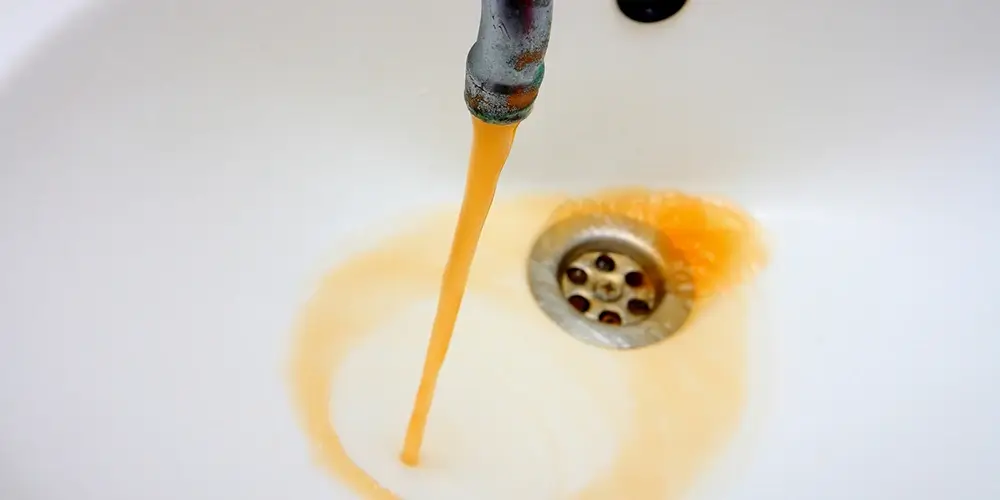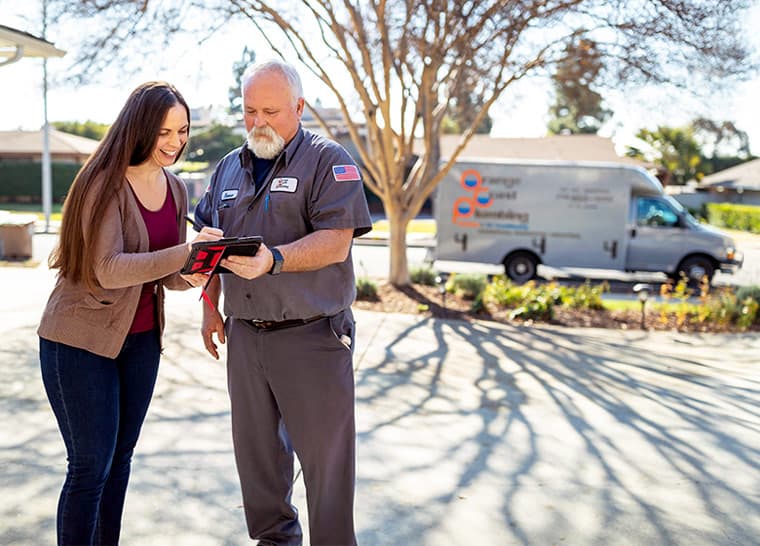When your tap water tap takes on a rust-brown shade, your first reaction might be shock, the second disgust, and the third horror.
Yes, orange water happens, especially in older homes, and if you’re reading this blog, it has probably happened to you.
But is the water safe to use? What should you do about it? Who is responsible? You or the city?
Is Rusty Water Safe to Drink?
Fortunately, rusty water is mostly an aesthetic issue that doesn’t pose health risks unless you have a medical condition like hemochromatosis.
That said, you’ll need to do something about it. Orange water can stain fixtures like your sink or bathtub and discolor clothes in the washing machine. Worse, it might indicate a more serious plumbing problem that needs immediate repair, like a badly decayed pipe on the verge of bursting.
Reasons for Orange Tap & Bath Water
1. Rusty or Corroded Water Pipes
Oxidized iron within pipes causes most water rust. Surprise, surprise — rusty pipes make for rusty water!
The zinc coating of galvanized pipes deteriorates over time, exposing the interior steel pipes to rust and coloring your tap water orange. High water pressure can break rust particles away from galvanized pipes to enter your home’s plumbing system.
Even copper pipes can corrode, leaching into your water supply and giving it an orangish hue.
Mineral deposits inside your water lines can color your hot water red, yellow, or brown. Low pH levels can corrode iron and steel pipes, discoloring the water.
You may have to replace a section of pipe in or leading to your home or, in some cases, repipe your entire home. In older homes, the lines may be too corroded to save.
2. Incorrectly Installed Pipes or Corroded Joints
Poorly installed pipes can cause various plumbing problems — including rusty water. A misaligned fitting can corrode and create tiny openings around the pipe joints.
Older pipes may have lead solder joints. If they corrode or any portion of your lines contains lead, you no longer have a cosmetic issue but a health and safety problem.
Have a certified plumber inspect your lines as soon as possible.
3. Corroded Faucets & Fixtures
Have you noticed rusty water only from one tap or fixture? That’s a sign of corroded faucets and fixtures that need to be replaced.
Or an accumulation of mineral deposits inside the pipes or at the base of your water heater can discolor water orange.
Fortunately, a plumber can repair a fixture without much fuss. However, if it’s a larger problem involving multiple fixtures, you may have to replace them.
4. A Rusty Water Heater or Heater Parts
Corroded water heater anode rods affect hot water more than cold since the sedimentary buildup oxidizes faster in hot temperatures. Replacing them should clear up your water supply.
The tank itself may have rusted, or the dip tube that injects cold water into the hot tank may be damaged — causing it to mix water with mineral deposits already there.
Water heaters last an average of 8–12 years, so if yours is older, now might be the time to invest in a new one.
Hard water can accelerate the rusting process, so it’s a good idea to test your water hardness. You can buy a home water hardness kit at most hardware stores.
A newer heater might need maintenance or replacement parts. You should flush the water heater’s tank every 6–12 months, especially if you have hard water in your area.
5. Old Municipal Water Systems
San Antonio, Texas, is blessed with a modern water system.
Philadelphia, PA, has municipal pipes as old as the hills (some pipes may be autographed by Ben Franklin).
Hyperbole? Perhaps. But the point is that some cities have done well to keep municipal lines up to date; others have not.
Parts of California have old municipal water systems. LA is known for its ancient and decrepit pipes (and you thought it was known for movies). Over 20% of the lines in Los Angeles were installed before 1931, when Shirley Temple was only three years old.
Shirley had clean drinking water. You may not be so lucky.
Old municipal pipes and fittings are subject to rust. Frequent water main breaks release sediment and rust particles into the water supply. Corrosion and discoloration occur when sediment and rust particles settle in the pipes.
If you’re dealing with a rusty water supply, there’s not much you can do about your municipal infrastructure — other than lobby for repairs or upgrades. Consider installing a filtration system to remove rust particles from your home’s water supply.
Luckily, many cities are already replacing old pipes to reduce pollution and prevent lead poisoning.
6. A Well with High Iron Content
Groundwater naturally contains iron. Minerals and rocks in the ground act as a filter, allowing iron to seep into groundwater.
Therefore, it’s common to find high iron content in wells, which can change over time and even fluctuate seasonally. So rust-colored well water may or may not be a concern.
A plumbing professional or water-testing laboratory can help you determine the exact cause of your rusty water and suggest appropriate solutions. If high iron content is the culprit, installing an iron filter, neutralizer, or aeration system may do the trick — but it’s best to consult a professional first.
In some cases, replacing your old pipes may be enough to restore clean and safe drinking water in your home. Again, a certified plumber can help you decide whether a simple repair or full-scale replacement is the best solution.
Conclusion
Old, corroded pipes are the usual cause of rusty or orange-colored tap and bathwater. Orange water could also trace to mineral deposits inside your plumbing lines, a broken dip tube in the water heater tank, or sediment entering the water supply through old municipal pipes.
Regardless of the cause, it’s critical to determine the source as soon as possible. Whether you decide on a filter system, pipe replacement, new water heater, or another solution, don’t wait too long before dealing with the problem. It never gets better on its own.
FAQs: More about Rusty Water
Q: What makes water appear rusty or brown?
Rusty water is typically caused by iron in your water supply, which oxidizes and turns rust-colored when exposed to air. This can occur in well water and municipal supplies, especially if there are corroded pipes in the system.
Q: Is it safe to drink rusty water?
While ingesting small amounts of iron from rusty water isn’t harmful to most people, it can pose a risk to anyone with hemochromatosis, which causes iron overload. Also, rust could indicate the presence of other dangerous contaminants or an underlying issue with your pipes.
Q: Can rusty water stain my fixtures and laundry?
The iron in rusty water can leave stubborn orange or brown stains on fixtures, sinks, toilets, and your laundry, which can be difficult to remove.
Q: How can I test for iron in my water?
You can purchase iron tests from hardware stores or online, and many water treatment companies offer more comprehensive testing services.
Q: What is the solution to eliminate rusty water?
Solutions range from installing water softeners or specialized iron filtration systems to replacing corroded pipes. The best approach depends on the source and severity of the rust.
Q: Does boiling water remove the rust?
No. It may concentrate impurities. Filtration is the most effective method for removing iron particles.
Q: How often should I check my water for rust?
We recommend regular maintenance and annual testing, especially if your water source or pipes are prone to rusting.
Q: Why is my hot water more rusty than cold water?
If rust is more pronounced in hot water, it could indicate rusting inside your water heater, where sediment and rust particles accumulate at the bottom.
Can rusty water cause health issues?
Q: What should I do if I notice rust in my municipal water supply?
Report the issue to your local water supplier. Rust in municipal water could be due to old or corroding city water pipes, and your report can prompt inspections and repairs.


